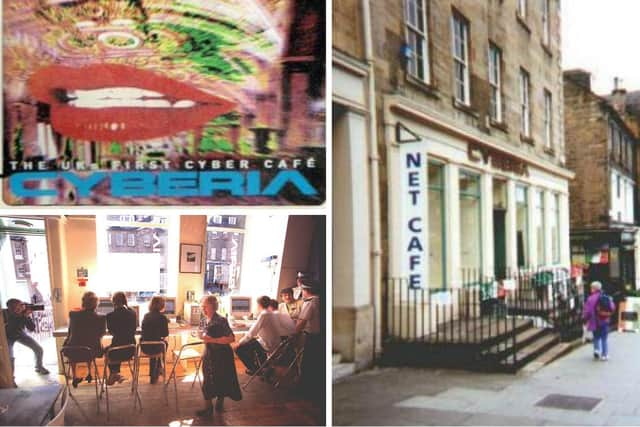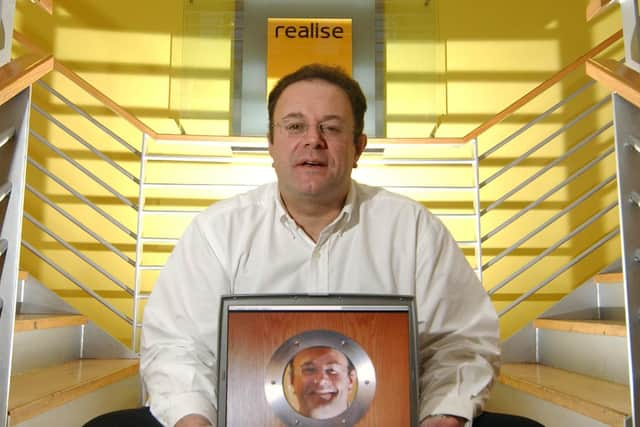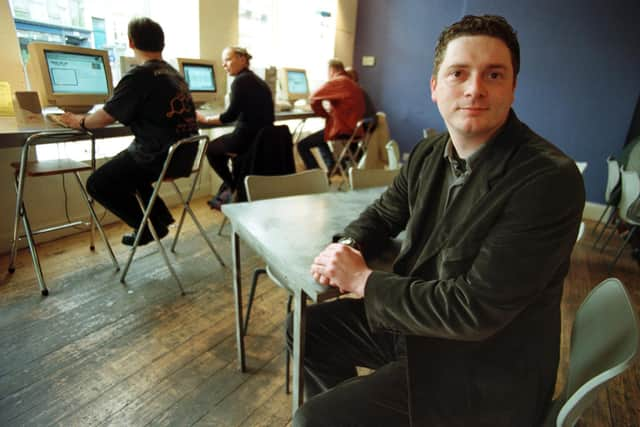Cyberia Edinburgh founders recall setting up Scotland's first internet cafe 25 years on
and live on Freeview channel 276
A quarter of a century ago, an Edinburgh dot-com revolution was born, as brothers Gavin and Douglas Nicholson introduced the World Wide Web to a whole generation of residents who had never surfed it before.
Based on an existing model already operating in London, and thought to be the world’s first, the entrepreneurial pair founded Cyberia internet cafe on Hanover Street in the heart of the Capital’s New Town.
Advertisement
Hide AdAdvertisement
Hide AdOpened to much fanfare in April 1995, the cutting edge cafe welcomed its first customers in an era when fewer than 2 per cent of UK households had access to the new-fangled “information superhighway”. It was the first cafe of its kind in Scotland.
A few months earlier, Gavin had attended the Cyberia London launch to see what all the fuss was about.
“It was all a bit rough and ready but attracting an enormous – global – media attention,” Gavin, 61, told the Evening News.
“I approached Douglas, he put a little bit of cash in too, and we decided to do up the first one in Scotland, in Edinburgh.”
Advertisement
Hide AdAdvertisement
Hide AdA franchise agreement was hastily signed with Cyberia London, but as Oasis and Blur were busy battling it out in the UK singles charts, the Nicholson brothers were engaged in a Britpop era skirmish of their very own with a rival internet cafe.
Ian McCarron, owner of Web13 on Bread Street, also opened a net cafe in the spring of 1995 and was very close to taking Cyberia’s crown as Scotland’s first.
A deal was quickly struck that would temporarily block McCarron from using Cyberia’s intellectual property and enabled the Nicholson brothers to open a week earlier.
Gavin explains: “We discovered he [Ian McCarron] had been down at Cyberia London the day before me and was setting up himself, so we were then racing to be the first and get the TV coverage.
Advertisement
Hide AdAdvertisement
Hide Ad“We didn’t get as much time to open as we wanted to. McCarron and Web 13 had been interdicted and had promised not to steal their IP, but it only delayed them by a matter of days.


“There was a bit of a rivalry there. We got the thunder in the press, he didn’t, which was probably fair.”
Priced at £2.50 per half hour, which the Nicholson brothers admit wasn’t particularly cheap, Cyberia boasted around a dozen PCs fed by 56k dial-up connections and using the most basic – Netscape Navigator 1.0 – web browsers. It was all a far cry from the flashy user interfaces and gigabit broadband many of us take for granted today, but for nineties youngsters, this was the future.
One such youngster to visit the cafe in its first year was local teen Caroline Leonard. Now in her forties, Caroline recalls getting to grips with the wonders of the web.
Advertisement
Hide AdAdvertisement
Hide AdShe said: “The Internet was pretty new and it was my first experience of it.


“We were chatting to someone thinking they were somewhere far away - she told us she liked Harrison Ford amongst other things - then we found out she was just in the next room of Cyberia.”
There were “Cyberguides” on hand to help first-time users, while the Edinburgh cafe had an in-house design team who built sites for the brothers, including The Cludgie, Cyberia’s official chat room, the name of which was inspired by the random scribblings people left on toilet walls.
Photographer and web designer Colin Usher joined Cyberia early on and quickly became an integral part of the team.
Advertisement
Hide AdAdvertisement
Hide Ad“It’s half a lifetime ago for me now – hard to believe,” said Colin, 50.
“I lived on Thistle Street and there was this rumour that there was this new cafe opening round the corner, so me and a bunch of pals went down, had a lovely beer at the new Cyberia and met Gavin and Douglas. Literally, within 7 days, I’d moved in to the spare room – because I had a Mac and I was doing graphics.”
Now based in the south of France where he runs his own photography and web design business with his wife, Colin recalls the buzz that surrounded the fledgling cyber cafe in those pre-smartphone days and the many famous faces who came in to check their inboxes.


He said: ““It was a really good vibe, lovely mood, and such a nice bunch of welcoming people.
Advertisement
Hide AdAdvertisement
Hide Ad“People would come in from all age groups. During the Fringe was quite funny, there were days when Joe Mangle, Martin Little, from Neighbours, would come in and say, ‘Hey, Colin, look after the kids, I’ve got a show at the Traverse’.
“Bill Bailey would be in one corner and Eddie Izzard in another, doing their emails. It was quite an exciting time.”
The cafe attracted a number of burgeoning computer programmers who would go on to become big players in the industry. Chris Van Der Kuyl, the man credited for developing Minecraft, was among the hot prospects to be found propped up against a Cyberia keyboard in the early days.
And, with New Labour keen on how the internet could drive a digital Scotland, even future prime minister Gordon Brown got in on the act, using Cyberia a number of times post-1997 for various press launches.
Advertisement
Hide AdAdvertisement
Hide AdColin Usher and the rest of the Cyberia team also produced the first websites for the likes of the Bank of Scotland and even The Scotsman newspaper, which the brothers believe was a world first.
“The first scotsman.com, that’s probably the one I’m most proud of actually,” said Colin, “We put up a holding page and asked folk to give us emails, to express interest. I think it was something daft, like 80,000 people said they want to know when The Scotsman’s online.”
“We have a long history with The Scotsman,” said Gavin, who is now semi-retired and living in Northumberland. “They were very keen to see what they should be doing to embrace the future.
“The Scotsman was online for about three or four years and generated from the back of the cafe. We even bought the scotsman.com URL for The Scotsman.
Advertisement
Hide AdAdvertisement
Hide Ad“Globally, it was probably the first completely automated online newspaper and it was all run from this truly electric server, which had the computing power of probably the lowliest iPad today.”
In spite of these corporate ventures, the net cafe side of Cyberia struggled to “wash its face” and turn a profit for the brothers – but it led to something far more lucrative.
In 1997, Gavin started up Realise, which would go on to generate millions the following decade as the country’s largest corporate website consultant.
As Realise took centre stage at the turn of the millennium, home internet access soared and outlets, such as the giant, 400-seater Easy Everything cafe on Rose Street, swallowed up Gavin and Douglas’s customer base.
Advertisement
Hide AdAdvertisement
Hide AdBy late 2001, the brothers took the decision to take Cyberia offline.
Gavin said: “Our investors, 3i, told us that one of the conditions of their investment in Realise was that we close down the cafe, so that’s what we did.
“People still come up to me and say they first used the internet at our cafe or even met their partner in one of our chat rooms. You don’t appreciate until it’s over how massive it was.
“I’m grateful for it and I’m grateful that out of it came a business that made us money.”
Advertisement
Hide AdAdvertisement
Hide AdCyberia co-founder, Douglas Nicholson, 57, says he and his brother always knew the venture possessed a short shelf life.
Douglas, who now works in a counselling role in Edinburgh, said: “I think we were aware from the very beginning that the potential for this was extraordinary, but we knew that it wouldn’t be very long until people started getting dial-up connections in their own homes. It was clear the cafe had a limited lifespan.”
He added: “It was all about the future, and that sort of Wild West sense of possibilities. For younger people in Edinburgh this was going to be their future and Cyberia really was the start of something.”
A message from the Editor:
Thank you for reading this story on our website. While I have your attention, I also have an important request to make of you.
Advertisement
Hide AdAdvertisement
Hide AdWith the coronavirus lockdown having a major impact on many of our advertisers - and consequently the revenue we receive - we are more reliant than ever on you taking out a digital subscription.
Subscribe to scotsman.com and enjoy unlimited access to Scottish news and information online and on our app. With a digital subscription, you can read more than 5 articles, see fewer ads, enjoy faster load times, and get access to exclusive newsletters and content. Visit https://www.scotsman.com/subscriptions now to sign up.
Our journalism costs money and we rely on advertising, print and digital revenues to help to support them. By supporting us, we are able to support you in providing trusted, fact-checked content for this website.
Joy Yates
Editorial Director
Comment Guidelines
National World encourages reader discussion on our stories. User feedback, insights and back-and-forth exchanges add a rich layer of context to reporting. Please review our Community Guidelines before commenting.